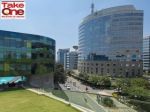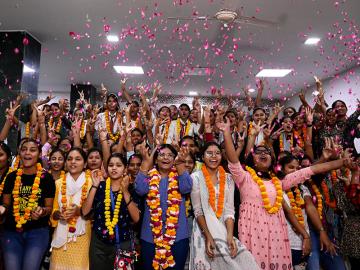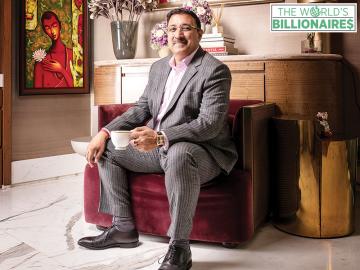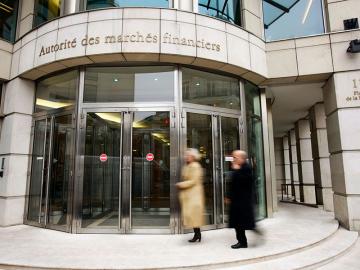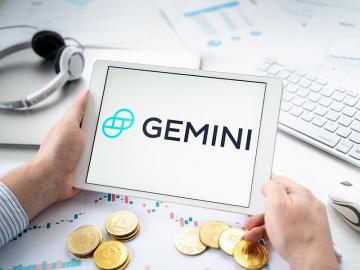The opportunity is not just to manufacture here for India, but for the rest of the world: Antonio Neri
The president and CEO of Hewlett Packard Enterprise on how India is strategic to the company's manufacturing plans and why the global IT sector may not feel much heat from a global economic slowdown
Antonio Neri, President and CEO, Hewlett Packard Enterprise
Image: Nishant Ratnakar for Forbes India
Antonio Neri took charge as the president and chief executive officer of the $29 billion Hewlett Packard Enterprise (HPE) in 2018. Since then, the Argentina-born executive has led the company’s initiative to acquire over 30 companies globally, and on his visit to India in March this year, HPE announced plans to acquire Hyderabad-based OpsRamp, an IT operations management (ITOM) company that monitors, observes, automates, and manages IT infrastructure.
Neri, who was in India after a gap of four years, sat down for an exclusive interview with Forbes India at the company’s recently inaugurated campus in Bengaluru to talk about the company’s plan for India, how India stands out amidst concerns of a global recession, plans to manufacture in India, why the global IT sector may not feel much heat from a global economic slowdown and the importance of going back to offices after years of work from home.
Edited Excerpts:
Q. This is your first visit in four years. What brings you to India?
I was here last in 2019 when we laid the foundation stone for our office in Bengaluru. Today I did the official Inauguration of the building, and over the next few months, we’re going to move people from five different sites around Bangalore into the new site which will host almost 11,000 people.
HPE India has the highest number of employees outside of the United States. It is more than 20 percent of the total company headcount. Fundamentally, it is one of the largest geographies for us from the headcount and business perspective.
Q. How much does India contribute to your revenue?
India is approaching probably 5 percent of the total revenue. But India is a large growing economy, and we are excited to see what the prime minister is doing to modernise infrastructure. Everything has been digitised and that means IT is going to play a huge role.
Q. The IT sector has been one of the biggest beneficiaries of the global pandemic. What has changed for you in India and across the globe as a result of that?
Before Covid-19, I laid out the vision for the company to focus on three key distinct areas. One was Edge (Edge computing), where we work, where we live, and where the vast majority of data is created. Think about a hospital, manufacturing floors, transportation, and hospitality. That's where all the action is. And that's a lot of where the digital transformation is taking place. Covid-19 accelerated that journey because people needed digital services to be able to operate.
The second aspect was the cloud. For us, the cloud is not a destination. It's an experience. And over the last four years, there has been an increased journey to adopt hybrid as the main operating model for the company.
And then the third piece of this data. Data is the new currency and I believe, in the future, data will have to be recorded on the balance sheet of companies because it's an important asset. Customers through the pandemic wanted to preserve liquidity and we focused on delivering edge, cloud, data, and AI as a cloud-native service through our platforms and a lot of that development has been here in India.
Also read: BC TO PC: How HP toppled Lenovo to reclaim the PC crown during the pandemic years
Q. Are you finding enough customers in India?
Oh yes. The business has grown more than 200 percent in the last year alone. People like the fact that we bring innovation across our platforms. Over the last two years, we have made remarkable progress globally. The company, in 2021, had $5 billion in the balance sheet related to the As A Service (AAS). Fast forward two years, and that’s at $10 billion. So, the momentum in the market to adopt As A Service has increased dramatically, partly on the back of the pandemic, because people want to preserve, but they also like the experience and we keep adding edge, Cloud, and AI services. AI is a massive opportunity.
Customers are adopting at a higher pace. HPE GreenLake has almost 70,000 customers and we have more than two million devices connected to the platform. We manage 1.2 exabytes of data through the platform on behalf of customers. So, customer adoption has increased dramatically.
Q. We are also staring at a global slowdown in 2023. How do you see the situation for the IT sector?
Well, we don't see that in IT. Except maybe a little bit in compute. But the reality is that IT will continue to be a prioritised focus for any enterprise. If you live in a digital world and the digital economy requires more service-oriented type of solutions, IT must enable that. And so, we are optimistic about it.
India is well positioned to grow as a country and to deliver solutions for the globe. India is the fastest-growing economy today on the planet. Globally, IT will continue to be resilient and as always, there will be ups and downs but in the long term, it is always looking up.
It's like during Covid-19. During Covid-19, enterprise business went down. But things like collaboration tools and mobile applications went up rapidly. Even the PC business and mobile went up rapidly. That has now been inverted in 2022 with people coming back to the office. The long-term opportunities are huge.
We believe there will be an acceleration because customers still need to modernise and transform their businesses. We get them a platform for which they only pay for what they consume. So instead of buying a large amount of IT that depreciates over a long period, they can have it on their premises. They only pay for what they consume and their budget goes down significantly.
Q. With India looking like a beacon of hope amidst a global slowdown, what are your plans here?
We want to double that business in the next three years. India is very strategic, and we do a lot of our innovation here. There is incredible talent here that is driving innovation. A big chunk of what we do from a global services perspective is happening here in Bangalore. A big chunk of what we do in the compute software for managing the fleet of compute platforms is done here in India as well. We have our back office here. If you look at the demographics here, it is very young, and obviously, people come with a lot of education that we can scale over time with the right focus that we bring. When you have more than 20 percent of the population here, it tells you that India is very strategic for us and will continue to grow and keep adding people here.
Q. During Covid-19 there was a lot of focus on working from home. What is HPE’s strategy?
It's a hybrid work. We just announced that we want the managers and employees to establish their team norms, which means the manager and the team establish how many days a week they need to be in the office to collaborate. But we want everybody to be at their office as often as they can.
Because it drives better culture. One of the key areas of focus is the culture of the company and it helps develop talent faster. The benefits of being in office significantly outweigh the flexibility. So, we need to find the right balance.
Q. The IT sector was also hit by moonlighting during Covid-19. Did you face similar problems?
No, we didn't have that. We have established a unique culture for the company where people are proud to come and work for us. It's driven by a purpose, which is to advance the way people work, to give back to the communities, to help each other, to advance in your professional career, and to live certain non-negotiable values. We follow our core beliefs strongly. We believe in accelerating what is next. We believe in the power of yes we can, and we want people to be a force for good.
Q. The last time you were here in 2019, you spoke about investing about $500 million in India. Has that been fructified?
We have executed against that. Still more work to be done. The pandemic slowed us in some areas, but that investment was about growing, which we have done. We have hired over 2,000 new team members and invested in new campuses.
Q. What are the areas you are focusing on?
It's all about the services aspect, and then obviously manufacturing. HPE builds and ships four servers per minute, 46 terabytes of storage per minute. So, we're looking at (manufacturing in India). We are working with the government to make sure the policy is right. It's not just the percentage, but the flexibility and I know there's going to be a new policy which is called the PLI 2.0, because the original PLI was more designed for the consumer type of products. We are looking forward to seeing the new version of that, which is probably more tuned for enterprise type of product.
We're already working on it with our partners to figure out what is the right model for that. But ultimately, to grow the business in India, we will have to do that and at the same time, the opportunity is not just to manufacture here for India, but for the rest of the world, as we need to continue to diversify and build the resilience in our supply chain.
Also read: Why some big corporations must split up to survive
Q. How is tech spending likely to shape over the next few years?
It would be a little bit uneven, no question. But some areas will continue to be super strong. Over a long period, you're going to see growth, because we live in an era where data continues to explode. The data needs to be stored. The data must be understood, and that data must deliver value. So just the function of the data growth, you need more IT.
India is one of the countries that have been leading the digital transformation when you have 750 million mobiles. And, then the demographic is very young. India is very resilient right now. We don't see what we see in India, for example, in the US and others. So here it seems to be going all in the same direction, which is growth. AI is a big opportunity for India when you think about 1.4 billion people, processing data every day, and the ability to provide better cures, and better services.
Q. The old HP ran into a lot of troubles. Has all that changed now?
Both companies have changed. My predecessor felt that being in the IT supermarket was no good. You had a $110 billion company with 300,000 employees, several lines of businesses, and probably 300,000 partners—it's difficult to keep every business competitive because you have so much capital. So, we split the company. HP Inc is PCs and printers and they have gone with their strategy. They have done, obviously, remarkably well during the pandemic.
And on our side, we went through more of the enterprise side with cloud, AI, and security and services in general becoming more relevant. And so, we invested in those. Together we have unlocked a large shareholder value and then each of them created more shareholder value as they executed their strategy.
Q. What’s next for the IT sector now?
I think AI is something that has been accelerated and we are at a unique point in time, for us as a company. Take, for instance, ChatGPT as we know it, and [to] train and retrain at that scale, you need supercomputing. We can deliver supercomputing as a cloud experience. And so, what we did last year, for the first time in the history of IT, we broke the exascale barrier. Exascale means you can process one quintillion operations per second. Now, put a language model like ChatGPT into that capability and you can start doing amazing things. So our goal is to offer supercomputing like a cloud. And we're working to do that as soon as we can.
Check out our Festive offers upto Rs.1000/- off website prices on subscriptions + Gift card worth Rs 500/- from Eatbetterco.com. Click here to know more.

